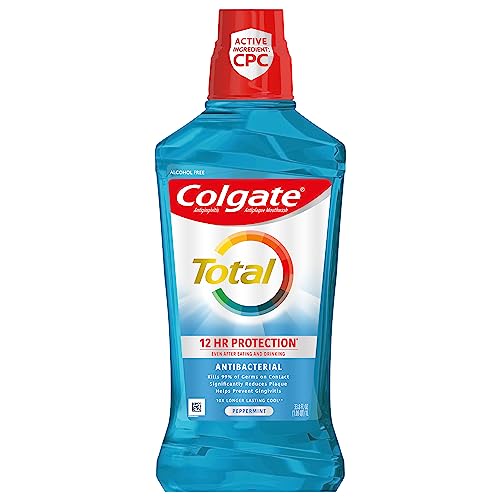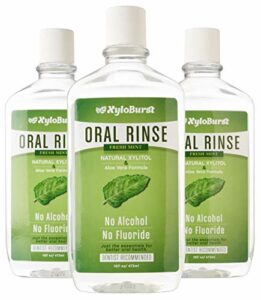Are you tired of dealing with painful cavities? We understand how frustrating it can be to constantly battle tooth decay. That’s why we are here to provide you with valuable information on a potential solution: fluoride mouthwash. In this blog post, we will explore whether fluoride mouthwash can truly help prevent cavities. We know how important it is to find effective ways to maintain our oral health, and we want to help you make informed decisions. So, let’s dive in and reveal the answer together.
Protect Your Smile with Fluoride Mouthwash
What is Fluoride Mouthwash?
Fluoride mouthwash is a dental product that contains fluoride, a naturally occurring mineral that has been proven to be effective in preventing tooth decay and cavities. It is a liquid solution that you swish around your mouth to help protect your teeth and strengthen tooth enamel.
How Does Fluoride Mouthwash Work?
When you use fluoride mouthwash, the fluoride in the solution coats your teeth and is absorbed by the enamel. This process helps to strengthen the enamel, making it more resistant to acid attacks from bacteria and sugars in the mouth. Here’s how fluoride mouthwash works to prevent cavities:
- Replenishing minerals: Fluoride mouthwash replenishes the essential minerals, such as calcium and phosphate, in your tooth enamel that are lost due to acid erosion. This remineralization process helps repair the early stages of tooth decay.
- Inhibiting acid production: Fluoride in the mouthwash can inhibit the growth of acid-producing bacteria in the mouth. By reducing the amount of acid produced, it helps prevent tooth decay.
- Enhancing enamel strength: Fluoride ions penetrate the tooth enamel, making it stronger and more resistant to acid attacks. This strengthens the overall structure of the tooth, making it less susceptible to cavities.
The Importance of Fluoride in Dental Care
Fluoride is an essential mineral in maintaining good oral health. Here are some key reasons why fluoride is crucial in dental care:
- Prevents tooth decay: Fluoride has the ability to prevent cavities by strengthening tooth enamel and inhibiting acid production in the mouth.
- Reduces enamel erosion: Fluoride helps to repair and remineralize tooth enamel that has been damaged by acid erosion, preventing further deterioration.
- Protects against sensitivity: By strengthening the enamel, fluoride can help reduce tooth sensitivity to hot, cold, and sweet stimuli.
- Beneficial for all ages: Fluoride is beneficial for both children and adults. For children, it can help protect their developing teeth, and for adults, it provides ongoing protection against tooth decay.
Choosing the Right Fluoride Mouthwash
When selecting a fluoride mouthwash, it’s important to consider the following factors:
- Fluoride concentration: Look for a mouthwash that contains between 0.05% and 0.2% fluoride concentration for optimal effectiveness.
- ADA approval: Check for the American Dental Association (ADA) seal of approval on the packaging, as it ensures the product’s safety and effectiveness.
- Personal preference: Consider factors such as flavor, alcohol content (if you prefer an alcohol-free mouthwash), and any specific needs you may have (e.g., sensitivity, gum health).
Research on Fluoride Mouthwash
Fluoride mouthwash has gained popularity as an effective tool for preventing cavities and maintaining good oral hygiene. In this section, we will delve into the scientific studies and research conducted on the use of fluoride mouthwash, presenting their findings and discussing the potential benefits and limitations of this oral care product.
The Effectiveness of Fluoride Mouthwash
Numerous studies have been conducted to evaluate the effectiveness of fluoride mouthwash in preventing dental caries. Here are some key findings:
- A study published in the Journal of Dental Research found that regular use of fluoride mouthwash reduced the incidence of dental caries by up to 29% compared to a control group.
- Another study published in the Journal of the American Dental Association concluded that fluoride mouthwash was effective in preventing cavities, especially when used in conjunction with other fluoride sources like toothpaste.
- A systematic review and meta-analysis published in the Cochrane Database of Systematic Reviews concluded that fluoride mouthwash, when used by children, significantly reduced the occurrence of cavities.
Benefits of Using Fluoride Mouthwash
Using fluoride mouthwash offers several benefits for oral health. Here are some key advantages:
- Cavity Prevention: Fluoride mouthwash helps to strengthen tooth enamel and make it more resistant to acid attacks, reducing the risk of cavities.
- Remineralization: Fluoride promotes the remineralization of teeth, helping to repair early-stage tooth decay.
- Accessible: Fluoride mouthwash is readily available over-the-counter in most stores and pharmacies, making it easily accessible for everyone.
- Convenience: Incorporating fluoride mouthwash into your oral care routine is simple and convenient. It can be used after brushing and flossing and requires no additional effort or time.
Limitations and Considerations
While fluoride mouthwash offers significant benefits, it is essential to consider a few limitations and potential considerations:
- Age Restrictions: Some fluoride mouthwashes may not be suitable for young children, so it is crucial to read and follow the product’s instructions and consult with a dentist if needed.
- Fluoride Intake: It is important to consider the overall fluoride intake from various sources, including toothpaste and water, to avoid exceeding recommended limits. Consult with a dentist to determine the appropriate fluoride regimen for your specific needs.
- Individual Sensitivities: Some individuals may experience sensitivity or allergic reactions to fluoride. If you notice any adverse effects after using fluoride mouthwash, discontinue use and consult with a dental professional.
Summary
Research on fluoride mouthwash consistently demonstrates its effectiveness in preventing cavities and promoting good oral health. By incorporating fluoride mouthwash into your oral care routine, you can benefit from its cavity-fighting properties and enjoy stronger, healthier teeth. Remember to consult with a dentist for personalized advice on fluoride use and to ensure it aligns with your specific oral health needs.
Expert Opinions and Recommendations on Fluoride Mouthwash
Fluoride mouthwash has been a topic of discussion in the dental community, with experts weighing in on its effectiveness and benefits. In this section, we will delve into the opinions and recommendations of dental professionals regarding the use of fluoride mouthwash. By examining their viewpoints, we aim to provide you with a well-rounded understanding of this oral hygiene product.
The Effectiveness of Fluoride Mouthwash
Dental experts widely agree that fluoride mouthwash can be an effective addition to a daily oral hygiene routine. Here are some key points that support this notion:
- Prevents tooth decay: Fluoride is known to strengthen tooth enamel and make it more resistant to acid attacks from bacteria and sugars. Using fluoride mouthwash can help prevent the formation of cavities and tooth decay.
- Reduces sensitivity: Fluoride has the ability to reduce tooth sensitivity by forming a protective barrier on the tooth surface. By using fluoride mouthwash, individuals with sensitive teeth can find relief and enjoy a more comfortable oral experience.
- Promotes remineralization: When tooth enamel is exposed to acid, minerals are lost, leading to demineralization. Fluoride mouthwash aids in the remineralization process by replenishing lost minerals and strengthening the enamel.
Expert Recommendations
- American Dental Association (ADA): The ADA recommends using fluoride mouthwash as part of a comprehensive oral hygiene routine. They endorse the use of mouthwash containing fluoride to help prevent tooth decay and maintain optimal oral health.
- British Dental Association (BDA): Similarly, the BDA advocates for fluoride mouthwash usage, particularly for individuals at higher risk of tooth decay. They highlight its benefits in reducing the risk of cavities and strengthening tooth enamel.
- Academy of General Dentistry (AGD): The AGD emphasizes the importance of fluoride as a preventive measure against tooth decay. They recommend the use of fluoride mouthwash for patients of all ages, especially those with a higher risk of developing cavities.
Choosing the Right Fluoride Mouthwash
When selecting a fluoride mouthwash, consider the following factors:
- Fluoride concentration: Look for mouthwashes with a fluoride concentration of around 0.05%-0.2% sodium fluoride or 0.1% stannous fluoride, as recommended by dental professionals.
- ADA Seal of Acceptance: Check for the ADA Seal of Acceptance on the mouthwash packaging. This ensures that the product meets the ADA’s rigorous standards for safety and effectiveness.
- Alcohol content: If you have sensitive gums or mouth sores, opt for alcohol-free fluoride mouthwash to avoid potential irritation.
Considerations and Safety Concerns
Fluoride mouthwash is a popular oral hygiene product that can provide numerous benefits for maintaining a healthy smile. However, it is important to understand the proper usage, potential side effects, and age restrictions associated with its use. In this section, we will delve into these considerations and address any safety concerns that may arise.
Proper Usage of Fluoride Mouthwash
To maximize the benefits of fluoride mouthwash and ensure its effectiveness, it is crucial to follow these guidelines:
- Measure the correct amount: Refer to the instructions provided by the manufacturer to determine the appropriate amount of mouthwash to use. Typically, this ranges from 10 to 15 milliliters (ml), but it may vary depending on the brand.
- Timing: Use fluoride mouthwash after thoroughly brushing your teeth with toothpaste. This allows the fluoride to penetrate the enamel and provide optimal protection against tooth decay.
- Swish and spit: Pour the measured amount of mouthwash into your mouth and swish it around for at least 30 seconds. Avoid swallowing the mouthwash, as excessive ingestion may lead to potential side effects.
- Frequency: Use fluoride mouthwash once or twice a day, or as advised by your dentist. Overuse can lead to enamel discoloration or other complications, so it’s important to strike the right balance.
Potential Side Effects of Fluoride Mouthwash
While fluoride mouthwash offers numerous benefits, it is important to be aware of potential side effects, which are generally rare but can occur in some individuals. These side effects may include:
- Staining: Prolonged and excessive use of fluoride mouthwash can lead to tooth discoloration. This is known as dental fluorosis and may manifest as white spots or streaks on the teeth. However, this is more commonly associated with excessive fluoride intake from multiple sources.
- Dry mouth: Some individuals may experience a temporary dry sensation in the mouth after using fluoride mouthwash. This is usually mild and resolves on its own, but if it persists, it is advisable to consult with your dentist.
- Allergic reactions: Although rare, some individuals may be allergic to fluoride or other ingredients present in mouthwash. If you experience any signs of an allergic reaction, such as swelling, itching, or difficulty breathing, discontinue use and seek immediate medical attention.
It is important to note that the occurrence of these side effects is minimal when fluoride mouthwash is used correctly and in moderation.
Age Restrictions for Fluoride Mouthwash
Fluoride mouthwash can be a beneficial addition to the oral care routine for individuals of various ages. However, it is essential to consider age restrictions and use caution:
- Children: Children under six years old should not use fluoride mouthwash, as they may accidentally swallow it. Swallowing excessive amounts of fluoride can lead to fluorosis, a condition that affects developing teeth.
- Supervision: Children between the ages of six and twelve should use fluoride mouthwash under adult supervision. This ensures they use the correct amount and do not swallow it.
- Adults: Fluoride mouthwash is generally safe for adults to use. However, it is still important to adhere to the proper usage instructions and not exceed the recommended dosage.
Safety Concerns
While fluoride mouthwash is generally safe when used as directed, it is crucial to consider the following safety concerns:
- Fluoride intake from other sources: Take into account your overall fluoride intake from various sources, such as toothpaste, drinking water, and other dental products. Excessive fluoride ingestion can lead to dental fluorosis or other complications. If you have any concerns, consult with your dentist for personalized advice.
- Accidental ingestion: To minimize the risk of accidental ingestion, always keep fluoride mouthwash out of the reach of children and individuals who may have difficulty understanding or following usage instructions.
By understanding these considerations and safety concerns associated with fluoride mouthwash, you can make informed decisions about its usage and ensure optimal oral health for yourself and your family. Remember to consult with your dentist for personalized guidance and recommendations tailored to your specific needs.
The Final Verdict: Exploring the Benefits and Limitations of Fluoride Mouthwash
In conclusion, we have explored the question of whether fluoride mouthwash can help prevent cavities. After examining the research, expert opinions, and safety considerations, we can confidently say that fluoride mouthwash can indeed be an effective tool in cavity prevention when used correctly. However, it is crucial to consult with a dental professional to determine if it is suitable for your specific oral hygiene needs. Remember, your dentist can provide personalized guidance and recommendations to ensure you maintain optimal oral health. Taking this proactive step will help you make informed decisions about your oral care routine.



















